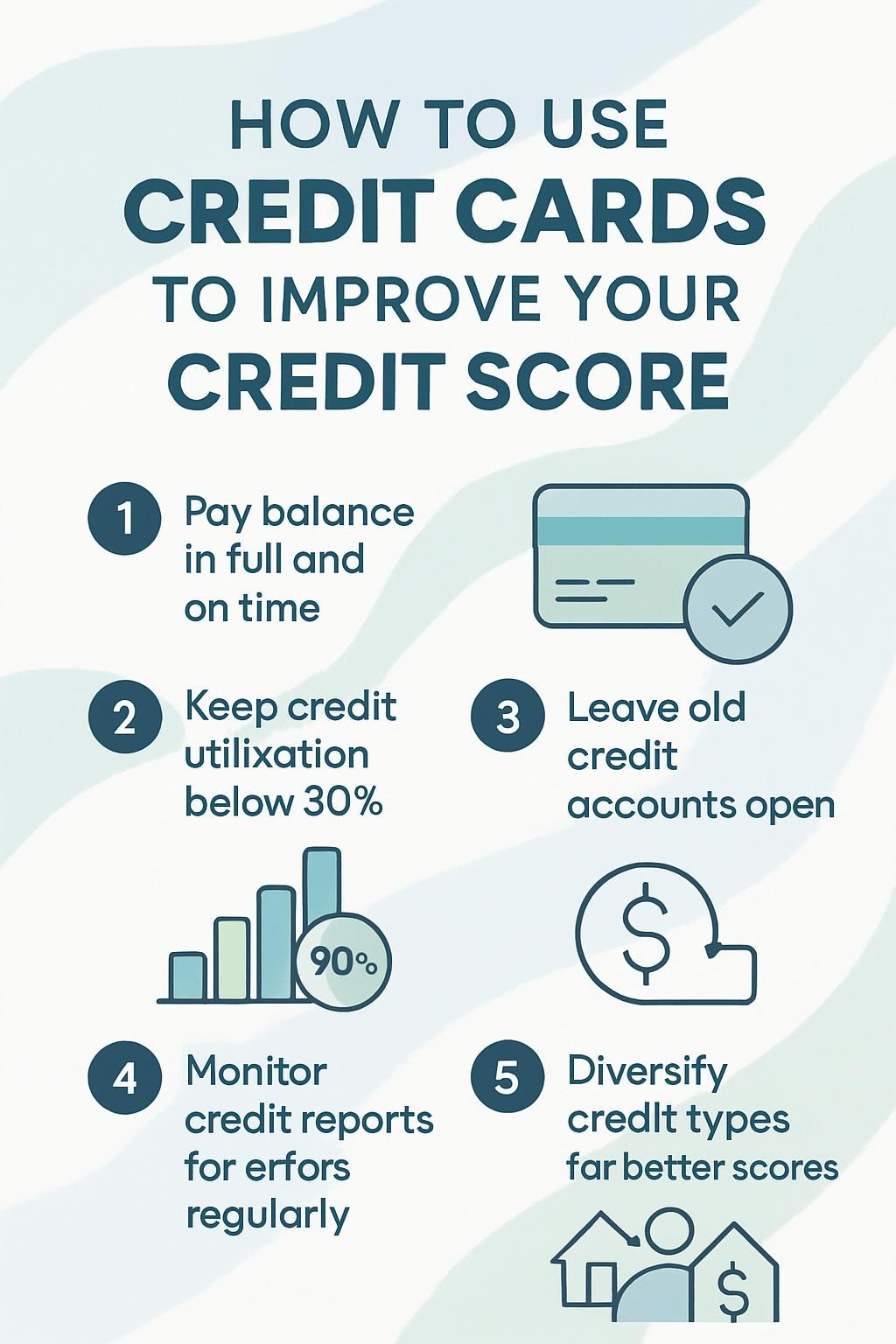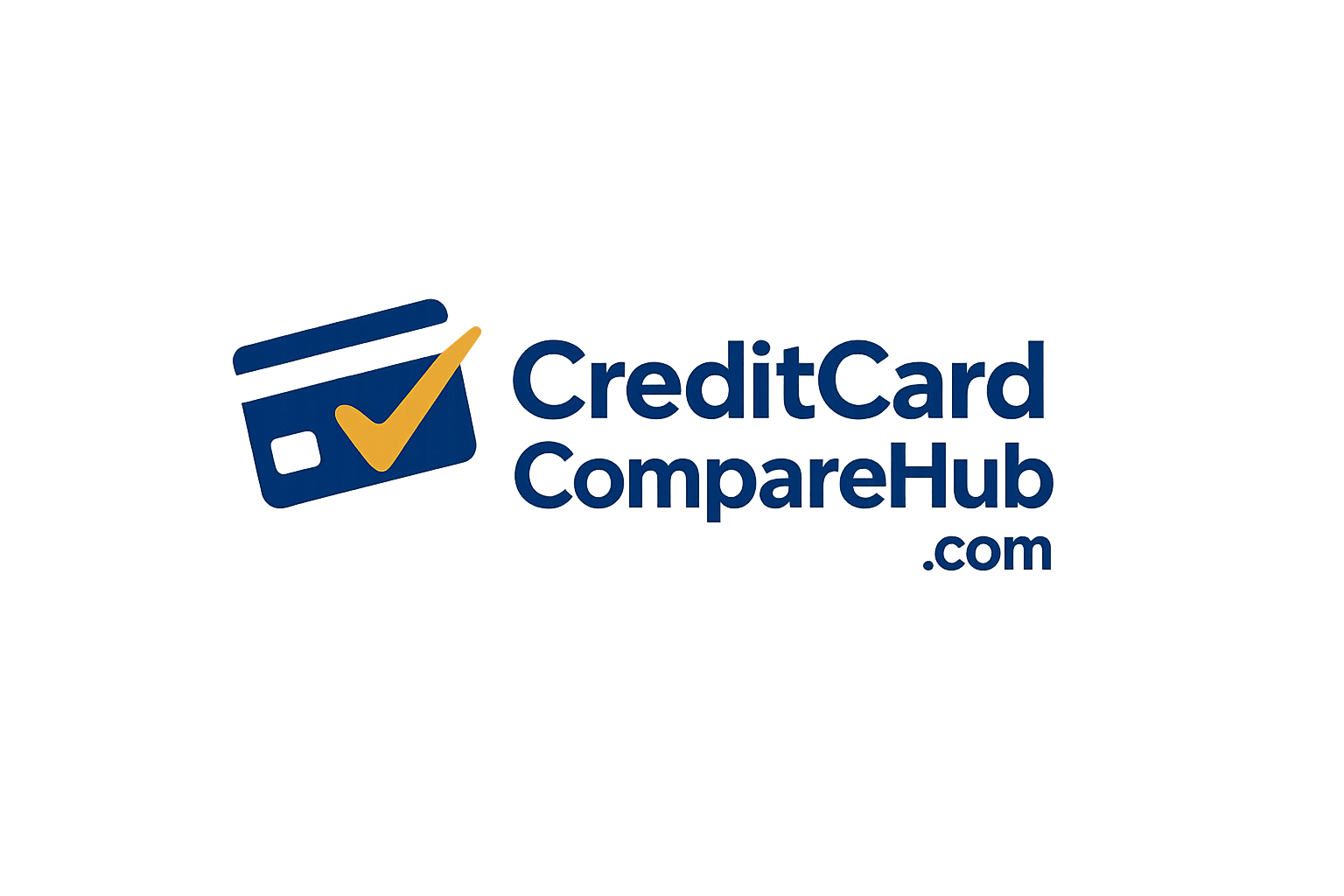How to Use Credit Cards to Improve Your Credit Score
Many people find it hard to raise their credit rating, even with plenty of resources. A strong payment history can help boost your score and open more financial opportunities. This guide will show you how smart use of credit cards improves your credit report, keeps debt under control, and strengthens your creditworthiness.
Stay with us to learn simple steps that lead to better scores.
Key Takeaways
- Paying your credit card balance in full and on time is crucial for maintaining a strong payment history, which significantly influences your credit score. Using banking tools like autopay can ensure you never miss a payment deadline.
- To achieve optimal credit utilization, it’s recommended to keep the rate below 30% of your total credit limit. For example, if your limit is $50,000, aim to maintain your balance under $15,000. This demonstrates responsible financial management and positively impacts your credit rating.
- Keeping old credit card accounts open can enhance the length of your credit history—a factor that contributes about 15% to your FICO Score. Older accounts provide evidence of long-term financial reliability.
- Regularly monitoring your FICO score and checking reports for errors are fundamental practices for identifying mistakes that could detrimentally affect your financial health. Trusted sources such as Experian or AnnualCreditReport.com offer free annual access to these reports.
- Diversifying types of available credits—by combining the use of revolving accounts (credit cards) with installment loans (auto loans or mortgages)—can improve scores by showing lenders capability in managing various forms of debt responsibly.

Use Your Credit Card Responsibly

Paying your credit card bill in full and on time helps you keep a strong payment history, which is one of the biggest factors in your credit score. Using clear alerts or autopay tools from your bank can make credit management much easier.
How can I ensure I pay my credit card bill on time every month?
Maintaining timely payments on your credit card is essential for preserving a robust credit score. Late payments could negatively affect your creditworthiness, hindering your ability to obtain loans or favorable interest rates in the future. Here are some strategies to manage monthly payments more efficiently:
- Initiate automatic payments through your bank account. This ensures the minimum payment or full balance, based on your selection, is transferred to your credit card company before the due date.
- Use online financial management tools that are available at no cost. Apps like Mint monitor your expenditure and alert you about upcoming bills, including credit card dues.
- Set reminders on your phone or calendar for the payment due date. An advance notification of a few days provides enough time for any manual transfers if you’ve not opted for automatic payments.
- Go through your monthly statements consistently. This habit checks for any unauthorized transactions and keeps you aware of the due date and the amount owed.
- Modify your billing cycle with the company if required. If the current due date conflicts with other financial commitments, a different day might simplify payments management.
- Pay above the minimum balance whenever feasible. This strategy lessens interest rates over time, and it also shows credit bureaus your fiscal responsibility.
- Contact customer service promptly if you foresee difficulty in meeting a payment deadline; they may provide solutions like late fee waivers or extended deadlines under specific conditions.
- Monitor your debt-to-income ratio; it’s sensible not to exceed your card expenditure beyond your monthly pay-off capacity to avoid lagging behind.
By applying these strategies, I’ve personally found handling credit card bills much less burdensome and more controllable, improving my financial well-being along the way.
Why should I avoid paying only the minimum balance on my credit card?
Paying only the minimum balance on your credit card can keep you in debt for years. Interest continues building on the remaining balance, which often makes it difficult to pay off what you owe.
Over time, even a high credit limit won’t protect your financial profile if you allow balances to carry over month after month. Credit card issuers use payment history and debt levels as major factors when calculating your credit score.
High interest payments also take money away from other investments or opportunities.
Carrying a large balance lowers your creditworthiness and raises concerns during any future loan applications.
Large unpaid balances increase your credit utilization rate, which can negatively impact your credit rating with agencies like Equifax, Experian, or TransUnion. Setting up automatic payments ensures that more than the minimum gets paid every billing cycle and helps avoid late fees or penalties.
Consistently paying down most of what you owe is key to maintaining a strong score and positive payment history—next, focus on how much of your available line you should actually use each month for optimal results.
Maintain a Low Credit Utilization Rate
Lenders check how much of your credit limit you actually use compared to what is available. Keeping this rate low shows strong financial management and helps raise your credit rating.
How much of my credit limit should I use to keep a good credit utilization rate?
To keep a good credit utilization rate, aim to use less than 30% of your total credit limit. For example, if American Express offers you a $50,000 limit, keeping your balance below $15,000 helps your credit score.
Credit bureaus like Equifax and Experian see low utilization as a sign of smart financial management.
I keep my balances at or below 10% on each card for even better results. This approach helped me improve my own FICO Score in just a few months. Apps like Credit Karma let you track both your overall usage and the limits on individual cards with ease.
Low credit utilization shows banks that you handle debt responsibly and increases your chances for top-tier loan offers in the future.
Should I pay off my credit card balance in full every month?
Clearing your credit card balance every month shows strong financial management. Credit reporting agencies like Equifax and Experian track both payment history and debt levels. Paying your statement in full keeps your credit utilization below 30 percent, which can positively impact your credit score improvement efforts.
For example, if you have a $50,000 limit and spend $5,000 but pay it off, you keep usage at only 10 percent.
On-time payments each cycle also build healthy payment history with lenders such as Chase or American Express. From my own experience, paying cards in full saved me from late fees and high interest while supporting a top-tier credit rating above 800 points for years.
This approach works even if luxury purchases are part of your lifestyle because staying ahead of deadlines proves consistent financial responsibility to creditors.
Build a Strong Credit History
Lenders assess your payment history and credit age to judge your creditworthiness. Using your secured card or regular card for small, frequent purchases can keep your accounts active and boost your score.
Why is it important to keep old credit card accounts open?
Keeping old credit card accounts open boosts your credit history length, which impacts about 15% of your FICO Score. Older accounts show that you can manage credit over time. I saw my own score rise by nearly 30 points after I resisted closing a ten-year-old card with no annual fee.
“Your oldest account is like a backbone for your financial reputation,” says John Ulzheimer, a recognized expert on credit reporting.
Credit scoring models value long payment histories without late payments or high balances. By keeping these older cards active, even with small occasional purchases, you support higher average account age and improve your creditworthiness in the eyes of banks and lenders.
This simple step also helps maintain a lower debt-to-income ratio because it increases total available credit while limiting new inquiries on your report.
How often should I use my credit card for small purchases?
Using your credit card for small purchases once a month keeps your account active and helps build a positive payment history. Lenders want to see regular activity and on-time payments in your credit report, which shows financial responsibility.
I usually charge coffee runs or gas fill-ups so my card stays in good standing without boosting my balance too high. The key is to pay off the full amount each cycle, since carrying even small debt can impact your credit utilization rate.
Spread out transactions that do not exceed 10% of your total credit limit. This approach keeps your debt-to-income ratio low while showing consistent use of available lines of credit like rewards cards or secured cards.
Little but frequent spending and prompt payment signals reliability and strengthens your credit rating over time.
When is the best time to pay my credit card bill to improve my credit score?
Paying your credit card bill before the statement closing date can improve your credit score. Credit bureaus use the balance reported on your monthly statement to calculate your credit utilization ratio, which makes up about 30 percent of your FICO Score.
If you pay off most or all of your balance before this date, a lower amount gets reported and helps keep your utilization low.
A good guideline is to keep your credit utilization below 10 percent for peak creditworthiness. For example, if you have a card with a $50,000 limit and spend $5,000 each month, paying it down to at least $3,000 by the time the statement closes shows responsible debt management and boosts financial credibility on paper.
Set an alert or automate payments through tools like Experian Boost or Mint for extra peace of mind.
Expand Your Credit Mix
Using different types of credit, like a secured card and a personal loan, shows lenders you can handle various accounts. This mix helps build your payment history and boosts your credit rating over time.
How can combining credit cards with other loans improve my credit score?
Mixing credit cards with other types of debt, like auto loans or home mortgages, can raise your credit score. Lenders want to see that you handle different kinds of accounts. A healthy mix shows financial responsibility and increases your creditworthiness in their eyes.
From my own experience, opening a small personal loan helped boost my score by nearly 40 points within six months due to payment history and improved debt-to-income ratio.
Responsible use of both revolving accounts (credit cards) and installment loans broadens your credit profile. TransUnion found in 2023 that borrowers with a varied credit mix had an average FICO score about 18 points higher than those using only one type of account.
Monitoring these details regularly is easy through free tools from Experian or Credit Karma; this ensures that all updates are reflected accurately on your next credit report review.
Let’s talk about how to check for errors on your report next.
Monitor Your Credit Score and Report
Check your FICO rating and credit file with trusted sources like Experian or Credit Karma. Use digital tools to spot errors fast and protect your financial profile.
How do I check my credit report for errors?
Maintaining a precise credit report is vital for upgrading your credit score. Identifying and rectifying mistakes early on can save you from future financial complications. Here’s your guide to examine your credit report for errors effectively.
- Secure your credit reports from the three primary bureaus: Equifax, Experian, and TransUnion. Annually, you can claim one free report from each bureau through AnnualCreditReport.com.
- Review your personal information for correctness. This includes your name, address, social security number, and work details. Inaccuracies at this stage could suggest mixed files or identity theft.
- Check account listings thoroughly. Check that every account is yours and is reporting accurately regarding payment history, balances, and account status.
- Pay close attention to the credit inquiries section. Confirm that each inquiry listed has your authorization since ones without it could suggest fraud.
- Inspect for accounts wrongfully reported as late or delinquent. Payment history plays a significant role in your credit score assessment, so inaccuracies here can leave a considerable impact.
- Crosscheck debt amounts with your personal records to ensure all debts listed are correct and current.
- Argue any inaccuracies directly with the reporting bureau(s). Furnish them with evidence supporting your disagreement wherever possible.
The above approach might show you unexpected perspectives about how even minor mistakes can affect your financial health significantly.
Transitioning to which free tools you can use to monitor your credit score will further equip you in handling your financial health productively.
What free tools can I use to track my credit score?
Tracking your credit score is a smart move to grasp your financial health. Fortunately, numerous free tools can help you monitor it.
Credit Karma offers a user-friendly platform where you can see your credit score from TransUnion and Equifax. They update weekly, allowing for frequent monitoring.
AnnualCreditReport.com gives you access to free yearly credit reports from the three major bureaus, Equifax, Experian, and TransUnion. This ensures you can review what’s affecting your credit score.
Mint, while known for budgeting, also provides free credit score checks. It uses updates from TransUnion and offers insights into factors influencing your score.
Credit Sesame presents an easy-to-understand analysis of your credit health with updates from TransUnion. Apart from showing your score, it suggests ways to improve it.
Experian offers a no-cost CreditWorks Basic plan that includes monthly updates on your Experian credit report and FICO Score. Experian also alerts you of any significant changes in your report that might affect your score.
Discover Credit Scorecard provides a free FICO Score to everyone, not just Discover cardholders. This tool pulls data from Experian and doesn’t require a hard check on your credit, so using it won’t impact your score.
MyFICO offers a basic version providing educational scores and insight into the factors contributing to your financial standing. Although more comprehensive features come at a cost, the basic insights remain helpful and free.
These tools offer valuable insights without hitting you with hidden charges or fees for peeking at your own numbers. I personally found these resources immensely useful for staying on top of my financial game without spending extra cash. Each platform has its unique set of features that cater to different needs, whether it’s detailed reporting or simple numerical tracking.
Conclusion
Using credit cards wisely can boost your credit rating. Pay bills on time and keep balances low against your limit. Set reminders or use online services to avoid late payments. Review your free Experian or TransUnion reports for errors each year.
Smart choices bring steady growth in creditworthiness over time.
To maximize your credit score, discover the best time to pay your credit card bill.
FAQs
1. How can using a credit card improve my credit score?
Using a credit card responsibly can help improve your credit score. You do this by making payments on time, maintaining low balances, and not maxing out your cards. These actions show lenders that you are capable of managing debt effectively.
2. What is the role of payment history in improving my credit score?
Your payment history plays a significant role in determining your credit score; it makes up about 35% of it! By consistently paying off your bills on time, you demonstrate to lenders that you are reliable and trustworthy with borrowed money.
3. Can keeping low balances on my credit cards enhance my credit rating?
Yes, indeed! Keeping low balances or utilizing less of your available limit indicates to lending institutions that you manage debt well. It’s recommended to use no more than 30% of your total available limit across all cards for the best impact on your score.
4. If I have multiple cards, should I close some to boost my credit rating?
Not necessarily! Closing unused accounts may negatively affect your overall available limit and increase utilization rates inadvertently hurting rather than helping your score.

 Previous Post
Previous Post Next Post
Next Post